How StereoLOGIC Accelerates and Secures Agentic AI Success

StereoLOGIC Agentic Digital Twin of Operations (ADTO) enables enterprises to implement agentic AI faster and more effectively.
Overview
Agentic AI, characterized by its ability to autonomously manage processes, make decisions, and adapt to new data, is revolutionizing industries from finance to healthcare. Unlike traditional AI copilots that assist with specific tasks, agentic AI systems take on end-to-end workflows, such as resolving customer inquiries or processing claims, with minimal human intervention.
However, implementing agentic AI comes with significant challenges: poor data quality, lack of operational visibility, workflow integration issues, and employee adoption barriers. According to McKinsey, 85% of AI projects fail due to inadequate data or unclear insights into operations, and only 1% of companies achieve AI maturity due to leadership and infrastructure gaps (McKinsey, Seizing the Agentic AI Advantage, June 2025).
Challenges and How StereoLOGIC Accelerates Agentic AI Implementation + Case Studies
Implementing agentic AI is no small feat. McKinsey’s Superagency in the Workplace report (January 2025) identifies key obstacles:
Data Quality and Governance
CHALLENGE

Poor Data Quality and Governance: Agentic AI relies on high-quality, structured data to make autonomous decisions. Yet, many enterprises struggle with ungoverned or unstructured data in legacy systems, spreadsheets, or hidden applications, leading to unreliable AI outputs.
StereoLOGIC SOLUTION

Overcoming Data Quality Issues Agentic AI thrives on clean, contextual data. StereoLOGIC’s Automated Data Discovery identifies and organizes both structured and unstructured data across applications, ensuring AI systems have the reliable inputs they need.
This capability aligns with Gartner’s 2024 emphasis on continuous data governance as a prerequisite for AI readiness (Gartner, Quick Answer: What Makes Data AI-Ready?).
CASE STUDY
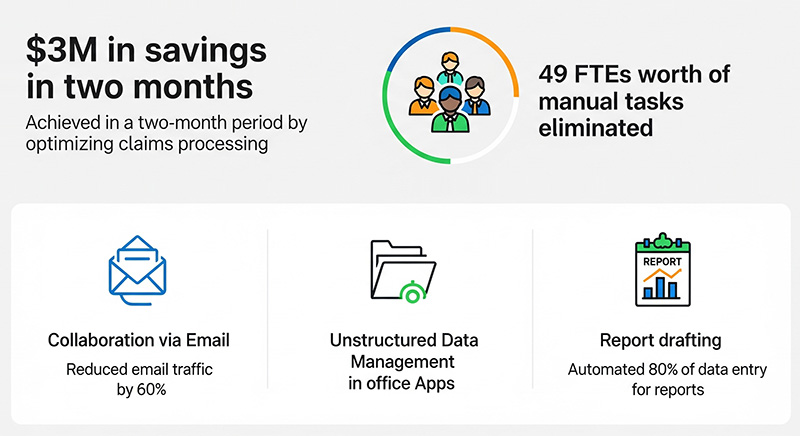
StereoLOGIC Case Study. Canadian Specialty Insurer:
Saved $3M in two months by eliminating 49 FTE worth
of manual inefficient tasks, such as collaboration via email, unstructured data management in office
apps, and report drafting.
Operational Visibility
CHALLENGE

Lack of Operational Visibility: Without a clear understanding of "as-is" processes - what employees do, how long tasks take, and where inefficiencies lie - AI deployments often target the wrong or misunderstood processes, resulting in low ROI or outright failure.
StereoLOGIC SOLUTION
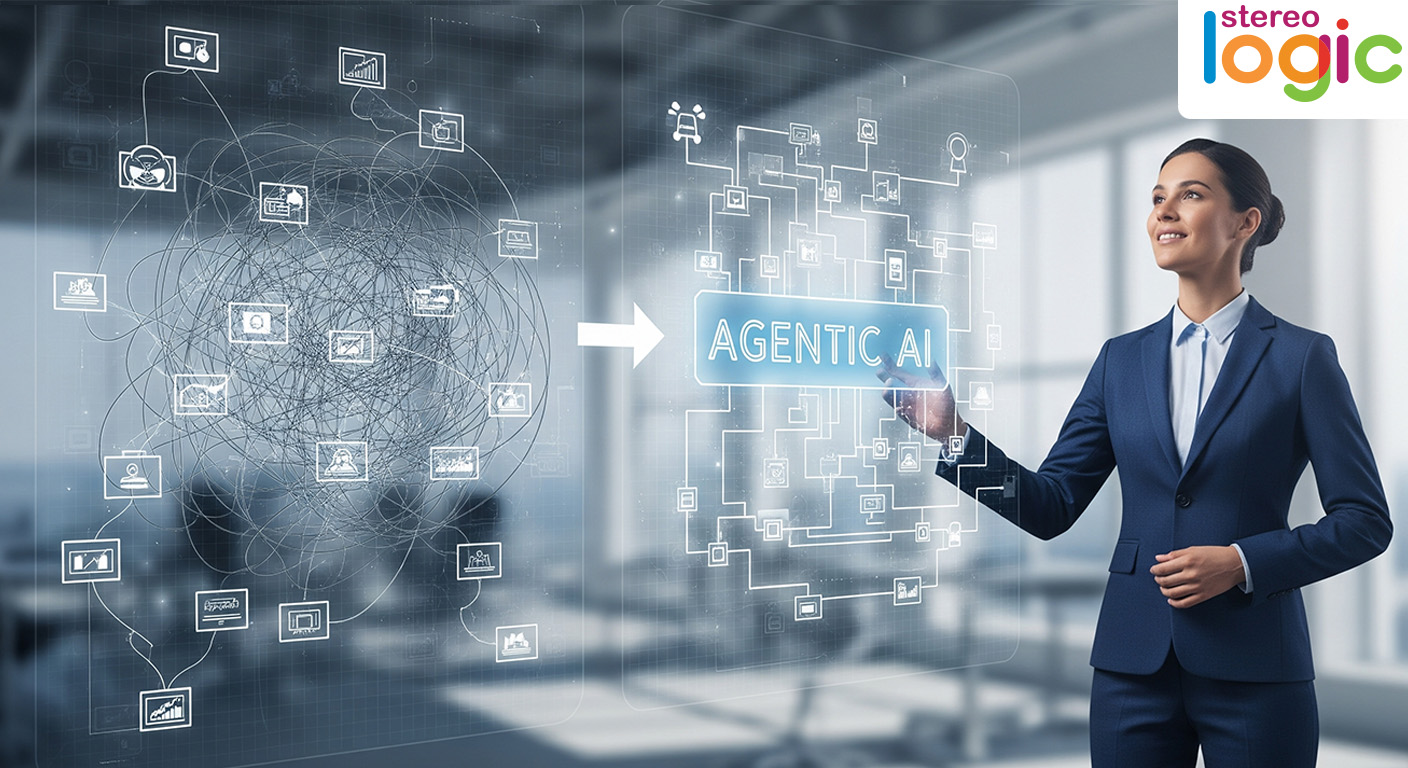
Enhancing Operational Visibility StereoLOGIC’s ADTO provides a 360-degree view of processes, revealing what employees do, how long the tasks take, and where delays or errors occur. This eliminates the guesswork that causes 70% of transformations to fail (McKinsey).
This visibility helps the companies to navigate agentic AI implementations and target the high-value processes, avoiding wasted automation efforts.
CASE STUDY

StereoLOGIC Case Study. Major Canadian Bank: Reduced customer service errors by 95% and saved $15M annually by using StereoLOGIC to monitor and refine employee operations at branches nation-wide using a new loan origination platform.
Workflow Integration
CHALLENGE

Workflow Integration: Agentic AI requires seamless integration into reimagined workflows, not just existing ones. Misalignment can cause process breakdowns, with 90% of high-impact AI use cases stuck in pilot mode (McKinsey, June 2025).
StereoLOGIC SOLUTION

Streamlining Workflow Integration: By generating detailed process maps and documentation (exportable to Visio/BPMN), StereoLOGIC enables enterprises to redesign workflows for agentic AI integration.
This aligns the re-engineered workflows with the capabilities of AI, reducing the risk of pilot-phase stagnation.
CASE STUDY

StereoLOGIC Case Study. Global Healthcare Group: Achieved $5.7M in saving within six months by outsourcing low-skill tasks, optimizing nurse staffing, and standardizing the process, with $10M in additional future savings identified.
Employee Trust and Adoption
CHALLENGE

Employee Trust and Adoption: Resistance to autonomous systems and lack of trust impede the adoption, particularly when employees are unaware of how AI aligns with their daily work.
StereoLOGIC SOLUTION

Boosting Employee Trust and Adoption: StereoLOGIC’s non-intrusive monitoring and clear visualizations (e.g., process maps, time metrics) help employees understand how AI will enhance their work, fostering trust.
Transparent insights bridge the gap between leadership and employees.
CASE STUDY

StereoLOGIC Case Study. Global Healthcare Group: Achieved $5.7M in saving within six months by outsourcing low-skill tasks, optimizing nurse staffing, and standardizing the process, with $10M in additional future savings identified.
Leadership and Strategy Misalignment
CHALLENGE

Leadership and Strategy Misalignment: Executives cannot accurately assess the AI usage in the company. Typically, less than half of employees use generative AI and only for 30% of the tasks. Only 20% of executives can accurately gauge employees’ AI usage, leading to strategic missteps (McKinsey, January 2025).
StereoLOGIC SOLUTION
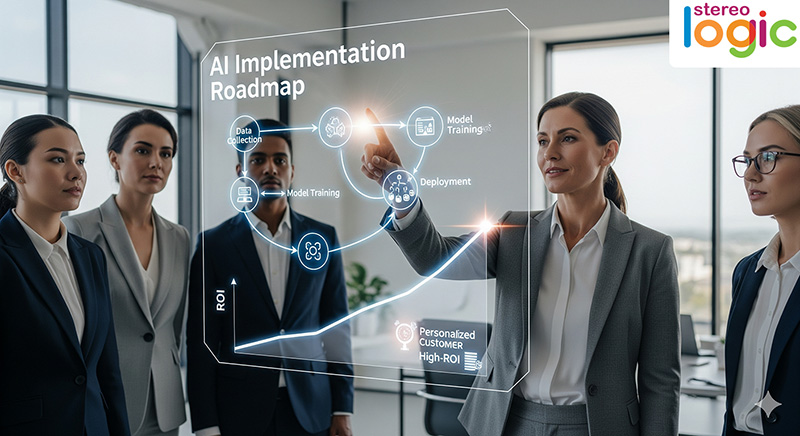
Driving Strategic Alignment: StereoLOGIC’s real-time analytics and process instrumentation empower leaders to prioritize AI use cases with high-ROI.
This data-driven approach ensures leadership decisions align with operational realities, accelerating AI maturity.
CASE STUDY
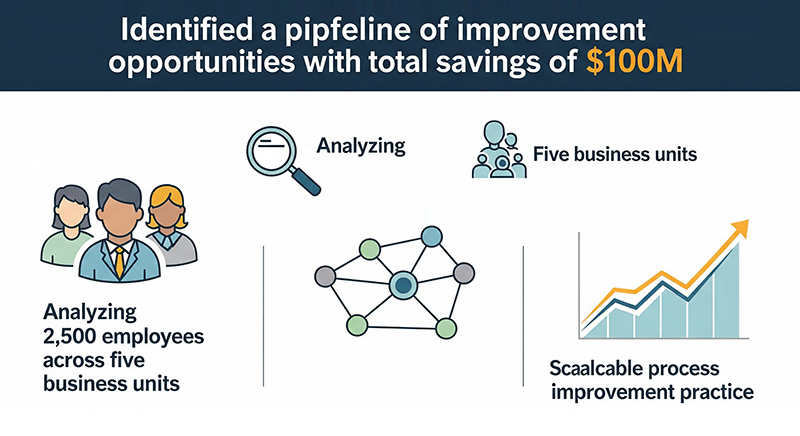
These challenges create a gap between AI potential and real-world success, risking wasted investments and delayed transformations.
Solution:
StereoLOGIC’s Agentic Digital Twin of Operations (ADTO)
StereoLOGIC’s patented ADTO technology (US Patents 10438166, 11107036) addresses these challenges by providing a real-time, dynamic model of how employees, processes, data, and systems interact. Unlike traditional process intelligence or task mining tools, which focus narrowly on system logs or partial tasks, StereoLOGIC delivers a comprehensive, end-to-end view of operations. Recognized by Gartner in 2025 for its superior computer vision and AI/generative AI capabilities (Market Guide for Task Mining Tools), StereoLOGIC enables enterprises to:

Uncover Hidden Data and Processes: Automatically records employee activities across all applications, including legacy systems and spreadsheets, generating a Master Data Dictionary that maps data usage, frequency, context and associated processes.

Provide True Operational Visibility: Produces auto-generated process maps, step-by-step operational manuals (SOP), workforce analytics, and detailed reports on time, frequency, errors, and inefficiencies. This, in turn, enables companies to find opportunities for Agentic AI adoption and accurately predict the ROI.

Enable Rapid Deployment of Agentic AI: Requires no desktop installations and delivers results within days, not months, ensuring immediate insights without disrupting employee workflows.
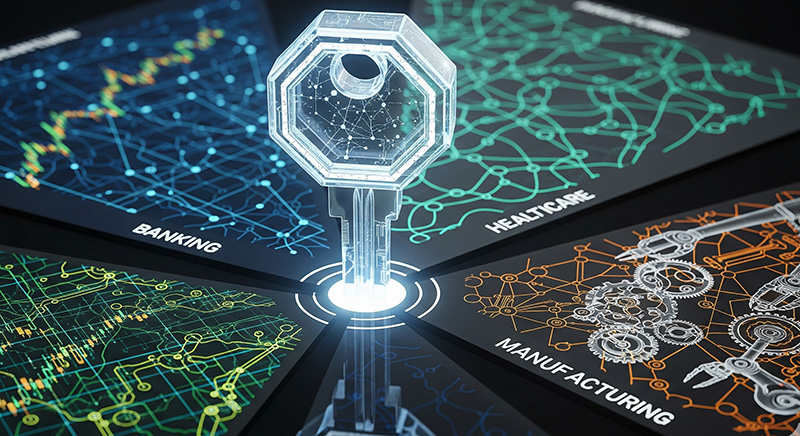
Support Platform-Agnostic Integration: Works with any IT system, making it a universal solution for diverse industries like banking, insurance, healthcare, and manufacturing.
By creating a fact-based, data-driven foundation, StereoLOGIC eliminates assumptions and aligns agentic AI initiatives with real operational needs, accelerating implementation and maximizing the ROI.
StereoLOGIC’s Competitive Advantage Over Traditional Tools
Unlike traditional process mining (e.g., Celonis) or task mining (e.g., UI Path), which offer partial insights and require months to deploy, StereoLOGIC delivers immediate, wholistic, and comprehensive results.
Its ability to uncover hidden data and recognize complex processes, including switching from task to task and process interruptions sets StereoLOGIC apart. Gartner praises StereoLOGIC’s focus on building a comprehensive data dictionary and its agentic AI-driven approach (Market Guide for Task Mining Tools, 2025).
Conclusion
StereoLOGIC’s Agentic Digital Twin of Operations is a game-changer for enterprises seeking to implement agentic AI.
By addressing critical challenges — poor data quality, lack of visibility, workflow misalignment, employee resistance, and strategic gaps — it enables faster, more effective AI deployments. Real-world savings of millions within months, as seen in healthcare, banking, and insurance, demonstrate its value.
As agentic AI reshapes industries, StereoLOGIC provides the clarity and foundation needed to turn potential into reality, ensuring enterprises achieve measurable ROI and sustainable transformation.
References
- McKinsey, Superagency in the Workplace, January 2025
- McKinsey, Seizing the Agentic AI Advantage, June 2025
- Gartner, Market Guide for Task Mining Tools, 2025
- Gartner, Quick Answer: What Makes Data AI-Ready?, 2024
- StereoLOGIC Unveils Fast, Non-Intrusive Data Discovery to Accelerate Transition to Data-Driven Enterprise, October, 2024.

Operational Intelligence »
The key differentiator of StereoLOGIC is its immediate adaptation
to changing operational priorities and ability to provide real time answers to sudden requests.

Digital Transformation »
StereoLOGIC provides a real-time holistic view of all employee processes, tasks and systems before, during and after transformation. Reduces risk, accelerates project timelines, and insures successful results.

Robotic Process Automation »
StereoLOGIC enables your organization to achieve RPA acceleration, generating detailed process maps and documentation with UI screens for each step, which is utilized as a critical input for RPA development.

Digital Optimization »
StereoLOGIC provides an un-paralleled 360° view into your AML operations available within a few days.